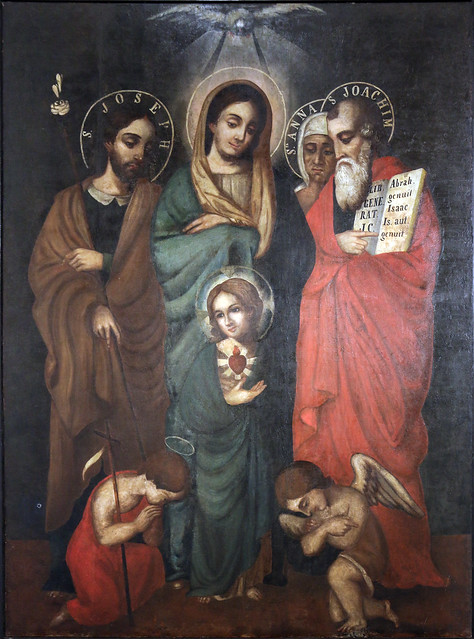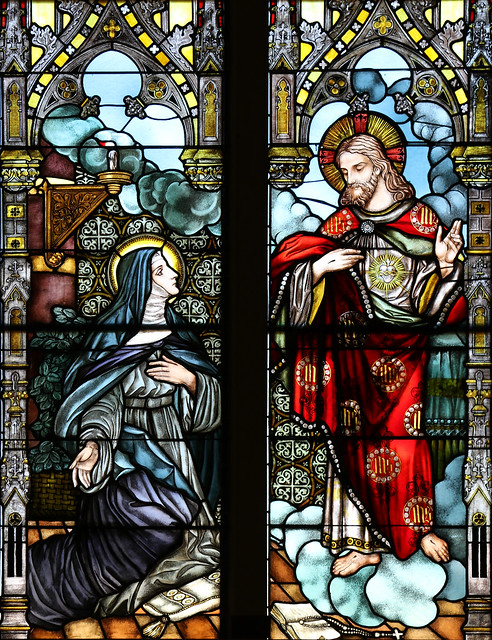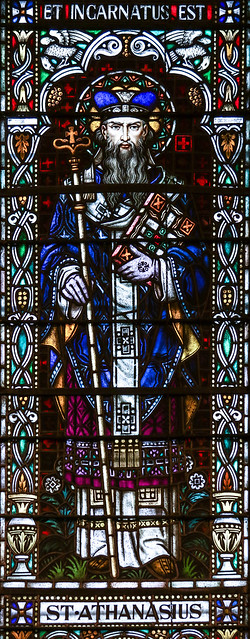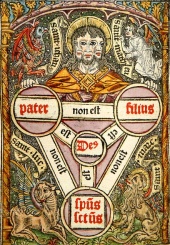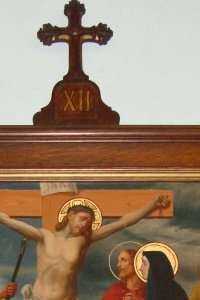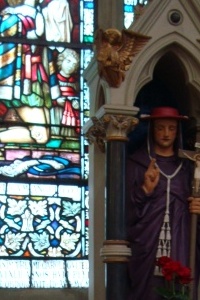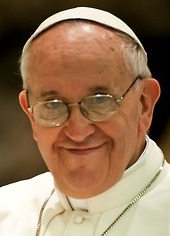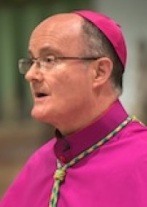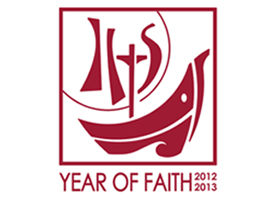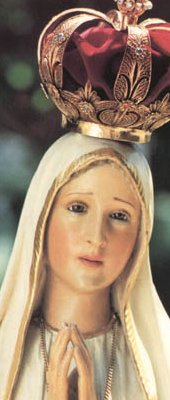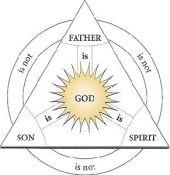The third Sunday of Advent and S. John the Baptist
Your priest may be wearing a subdued shade of rose today, instead of the Advent purple/violet. And this is because the introit of the Mass is
Gaudéte in Dómino semper: íterum dico, gaudéte, Dóminus enim prope est.
which is to say, Rejoice in the Lord always, and against I say, Rejoice, for the Lord is near. Also, S. Paul says to us at the head of the second reading, Rejoice always. Rejoicing in the Lord is part of the Christian attitude to life, no matter what life throws at us. Such was the attitude of the Hebrew people, of whom Christ permitted himself to be a part. In the midst of great trials, of the great misfortune that came with being a relatively small people, living in a land that was and still is the desire of all the nations. We inherit that joy, in all circumstances, as Paul says.
And so we are at the mid-point of Advent, and the great feast is almost upon us. The Lord is near. There is a sense of us being almost-there. Despite the market-place telling us repeatedly that it’s Christmas time, we are still only almost-there. Time and memory are a strange experience in the sense that the Christian tradition presents them to us [link]. When we mark calendar events such as anniversaries as Catholics, the event has both already happened and is still going on. So, at Holy Mass, we are gathered around at the foot of the Cross and around the Empty Tomb on Easter morning. So, also, at this time, we live in Judaea before the birth of Christ, feeling the electricity in the air as the arrival of the God-man becomes imminent, although we cannot see where he may be coming from.
And that brings us almost naturally to S. John the Baptist. John was the last of the prophets of the time before Christ, and he was very like his predecessors in his sense of excitement at the vision he saw of a Light beginning to dawn. The time was fulfilled, he knew, and the words of S. Isaiah in today’s first reading could very well be his: The Spirit of the Lord is upon me, for He has anointed me to bring good news to the poor, to heal the broken-hearted, to proclaim liberty, to announce the favour of God, and so I rejoice with all my heart. It is the voice of Christ, of course, speaking centuries ago in Isaiah, now again in John, and a but a moment later in His own person. Time melts together in that joyful announcement of the advent of God, expected and yet unexpected. Expected in itself, unexpected in its manifestation. We are all of us to be like S. John the Baptist, for we are now heralds of the Second Coming of Christ, His coming in Majesty. We must be together, as a Church, a voice crying in the wilderness, Make a straight way for the Lord, for His return is imminent. S. Paul tells us how, in brief, in the second reading: always rejoice, pray endlessly, give thanks, keep what is good, avoid evil.
Been away for a while, less time for the blog…
So, I shall come back more occasionally. How’s about a video? To God be the Glory…
The thirty-second Sunday of Ordinary Time: watch and wait, be prudent
Psalm 111: a sermon on the Just Man (and Woman) of the Old Testament
The content of this psalm is sprinkled variously around the Old Testament and informed generations of Hebrews, generations of Jews, and built the synagogues and the primitive Christian Church. Of course, Christ developed our understanding of our inheritance upon the earth, and told us where true glory and wealth are to be found.
Blessed is the man that feareth the Lord: he shall delight exceedingly in his commandments. His seed shall be mighty upon earth: the generation of the righteous shall be blessed. Glory and wealth shall be in his house: and his justice remaineth for ever and ever. To the righteous a light is risen up in darkness: he is merciful, and compassionate and just. Acceptable is the man that sheweth mercy and lendeth: he shall order his words with judgment:
Because he shall not be moved for ever. The just shall be in everlasting remembrance: he shall not fear the evil hearing. His heart is ready to hope in the Lord: His heart is strengthened, he shall not be moved until he look over his enemies. He hath distributed, he hath given to the poor: his justice remaineth for ever and ever: his horn shall be exalted in glory. The wicked shall see, and shall be angry, he shall gnash with his teeth and pine away: the desire of the wicked shall perish.
See also Psalm 14. The just man is merciful always and compassionate, a just judge, as his Lord is. And he stands firm against evil, strengthened in his faith. He is generous and lives for other people. And he is a great annoyance to the enemies of God, who will persecute him and will not be satisfied, for they cannot break him. Thousands upon thousands of Christians are slaughtered every year.
Inspirational: Paul Moyse walks us through a painting
The Pleiades (Messier 45)
Forty-fifth on the Messier catalogue of deep-sky, blurry objects is this popular star cluster. The picture is, of course, not mine. There is a link to the website it comes from below it. More information on M45 here and on the mythology of the seven sisters here.
Blessed John Henry Newman on writing sermons
Blessed JHN on writing sermons
It’s always good to get advice from the experts. And I’ll take all the help I can get.
Natural birth of an elephant
This is interesting: in the old days, there used to be right and wrong ways…
…of receiving the most Blessed Sacrament at Holy Communion. From this historical image, it seems that this was born of such a great devotion for the Sacrament that not the smallest part of it could be allowed to fall to the floor, or on one’s hands or clothing. Yes, that is interesting, indeed.
This is a beautiful icon: if God had a Mother, he also had two Grandparents
Remember Fr. Hamel?
He was butchered just over a year ago now while celebrating Mass, in odium fidei, that is to say, out of hatred for the Faith. Please remember in your prayers those Christians who suffer everyday for what still for us is a luxury: the free practice of religion. And may the martyrs of the Holy Church pray for us.
S. Martha, sister of Mary and Lazarus
I have an instinctive appreciation of Martha (her memorial day today), who tried to offer hospitality to the first bishops but was told by Christ that her sister had chosen the better part. I suspect that there is a place in heaven for both expressions of charity: the patient care for other people and, above all, the contemplative love of God.
I have been entertaining myself with Youtube clips of the old Top Gear
No, not the old, old Top Gear of the eighties and nineties. The old Top Gear of Clarkson-May-Hammond. I shall provide an example below. Of course, this comes from reading that biography of the television show that I mentioned earlier.
S. James the Greater, apostle of the Lord
“And to James the son of Zebedee and his brother John he gave the name Boanerges, that is to say the ‘Sons of Thunder. – Mark 3:17
James is called the greater to separate him from the other apostle of Christ, James, called the Lesser. James the Greater was the brother of John, the beloved disciple, who is often shown in Latin iconography at the foot of the cross. James and John, according the the first reading at Mass today, attempted infamously to find places at the side of Christ in his glory, without apparent regard even for the prince of the apostles, Peter. So goes the story here presented (Matthew 20: 20-23):
Then came to him the mother of the sons of Zebedee with her sons, adoring and asking something of him. Who said to her: What wilt thou? She saith to him: Say that these my two sons may sit, the one on thy right hand, and the other on thy left, in thy kingdom. And Jesus answering, said: You know not what you ask. Can you drink the chalice that I shall drink? They say to him: We can. He saith to them: My chalice indeed you shall drink; but to sit on my right or left hand, is not mine to give to you, but to them for whom it is prepared by my Father.
The Church remembers James with honour as being the first of the Apostles to find martyrdom for the cause of the Catholic Faith. For, as S. Luke tells us in the Acts of the Apostles, James was targeted by Herod Agrippa, last of that cruel dynasty of rulers, and because his murder pleased the anti-Christian sectarians, he tried to get Peter himself (Acts 12: 1-5):
And at the same time, Herod the king stretched forth his hands, to afflict some of the church. And he killed James, the brother of John, with the sword. And seeing that it pleased the Jews, he proceeded to take up Peter also. Now it was in the days of the Azymes. And when he had apprehended him, he cast him into prison, delivering him to four files of soldiers to be kept, intending, after the pasch, to bring him forth to the people. Peter therefore was kept in prison. But prayer was made without ceasing by the church unto God for him.
But here ends the story of James in the Scripture (although tradition tells of a successful mission to Spain), just at the point when he discovered what it meant to sit on any side of Christ in his glory. Apostleship is accompanied always by martyrdom, even today, and the Apostles themselves were all viciously killed, with one exception: John, the brother of James, whose message until the end to all who would listen to him was that of fraternal love. But that is another story.
S. Mary Magdalene, she who loved much
The gospel of Matthew, chapter 7, tells of how Mary of Magdala very daringly approached the home of a pharisee called Simon, when Christ was visiting. She proceeded to bathe his feet with her tears and then anoint them with oil, doing far more than Simon himself had cared to do. This pharisee, like so many others of his time and like so many of our time, was superficial in his observance of the elaborate customs that the pharisees had built up around the observance of the Law of Moses. Earlier in the chapter, Christ had tried to get them to see beyond the outer observance of his cousin S. John, the Baptist (vv. 24-30). Here he reacts with affection towards this penitent soul, who had done all she could think of to express her sorrow for sin, and invites the pharisee and all of us to look further than appearances.
Today we mark the feast day of S. Mary Magdalene, the penitent. As the quote from Christ in the picture says, the punishment for her many sins (peccata multa) is remitted, for she loved greatly (dilexit multum). And then follows an echo of the Lord’s prayer: to him however of whose fewer sins are forgiven, it is because he has loved less. May S. Mary Magdalene, penitent, pray for us sinners.
Devotion to the rosary, the Divine Office…
More from Michel d’Anastasio
I love his work!
When I see beautiful work like this specimen
…from Michel d’Anastasio, I remember my great love for Biblical Hebrew and my desire to learn to read the Torah in the ancient type. It took me two years to come up to a basic standard. That ended a year ago when I ended my degree course, and I’ve been too lazy since then to dust off my copy of the Tanakh… maybe it’s time to begin again. Let’s see if I can put in a quick section from my favourite psalm – 50(51): 9 – which begins with ‘Have mercy O Lord, according to your great mercy…’:
תְּחַטְּאֵנִי בְאֵזוֹב וְאֶטְהָר; תְּכַבְּסֵנִי, וּמִשֶּׁלֶג אַלְבִּין
Asperges me hyssopo, et mundabor; lavabis me, et super nivem dealbabor.
So, then, first in the Hebrew, then in the Latin (our ancient language, because we are still Romans). This part of Psalm 50 is an important part of our Roman liturgy, which we inherit from our Hebrew ancestors in the faith – the sprinkling with holy water, or Asperges. This last word is a second person imperative of the Latin word aspergere, or sprinkle, whereas the hyssop refers to a particular herb with cleansing properties, that was used by the Hebrews for liturgical sprinkling. So the English translation of the above is
Thou shalt sprinkle me with hyssop, and I shall be cleansed: thou shalt wash me, and I shall be made whiter than snow.
I have underlined the corresponding words for ‘I shall be cleansed,’ since that is the most important part of this penitential psalm of the great King David, repenting of his great sin. We all want to be free from the ancient curse that sin brought upon us when our human nature was tainted. That is why religious rites exist in both the ancient Hebrew community and in the Catholic Church for regular atonement with God. The second part of this ninth verse of the psalm repeats the sentiment of a washing by God and being cleansed. Keep in mind that everything that we do in the Catholic Church has a reason and a tradition behind it and that often reaches far beyond the medieval period and the early history of the Church and into the depths of our common heritage in the Hebrew religion.
The thing about having a dozen and more interests
…is that there are always books to read in the city library and in the Amazon lists. Here are three of the books currently scattered about my rooms:
- This first I’ve been crawling through since November and is in a vaguely interview-type format. It’s called The Power of Silence and was put together by Nicolas Diat, who was interviewing an African cardinal in Rome, Robert Sarah (pron. Sa-RÁH). The cardinal declares that modern culture has forgotten how to be silent and must learn to give up the constant noise of interaction, for the voice of God is heard in the silence. I thought I would try to read it in the cardinal’s native French, which is probably why it’s taking so very long. It is certainly inspirational in its material and probably the most important Catholic work at the moment.
- The second refers to my earlier interest in automotive engineering in my teenage years when, like every other young lad then and since then, I watched every episode of the famous BBC2 programme Top Gear. It’s called The Top Gear story and is authored by Martin Roach. There has been a recent, significant overhaul of the show, and primarily of the three main presenters. But I still remember its previous two incarnations and this book deals with the Clarkson-May-Hammond series and should prove an entertaining read, especially since I finally own a car myself.
- One of my first drives was down to the only monastery in our diocese, the Cistersian monastery of Mt. S. Bernard in Leicestershire. They have an excellent little book and gift shop and is a largely unknown resource. There I found a giant picture-book called the Catholic Priest: image of Christ, put together by Steen Heidemann. The priesthood is one of the central features of the Catholic religion, in both its Western and Eastern realities, and it’s no surprise that our iconography has featured venerable and unknown priestly figures. This book collects some beautiful instances and I shall carefully thread my way through it.
Those are three of about… erm… twelve.
Watch this gentleman copy a Rembrandt
…while I try to find some other nice things to post on this old blog.
Well, I finally managed to get past the dreadful driving L-test
…and I’m starting to get about the country a little. Glossop in the summer, at some time, no doubt. As for the process of passing the test, all I’ll say is that the licensing authority run an excellent business. Anyhow…
Solemnity of the most Sacred Heart of the Lord
Here’s Dr. Adams, who was badly represented by that Robin Williams film
A dedicated man, with a unique and wholistic vision of medical health-care. As we celebrate tomorrow as a Day for Life, let us consider what it is that is vital in the human experience.
About the Mass: the first post
Some time ago, our Bishop, Msgr. Patrick, mentioned that we do not often preach about the Mass, what we have and why we have it. So, it’s time for a series of posts that address certain particular parts of the Mass. As any visitors to this blog may have noticed, I don’t post very long articles usually, with foot-notes and further resources. I move instead with pictures and videos, the social currency these days. We seem to prefer headlines these days to in-depth articles.
So, we’ll begin with a picture and a statement. What is the Catholic Mass, as it stands today and as it has been in the past, in all its various guises, in the East and the West? What is the design of the congregational effort at standing, sitting and kneeling, which is contained within a fairly elaborate liturgy? Well, its purpose is to honour what lies at the centre of the sacrificial offering. And that is not the reading of Holy Scripture, important though that is, honoured itself with great attention and standing. It is not the homily, however worthy that effort may be. It is the Real Presence of our Lord and Saviour Jesus Christ during and after the Eucharistic Prayer and until its departure into the tabernacle at the end of Mass. Everything moves around that, everything. And it is entirely Catholic to kneel before that which is Holy.
What about the images and relics of the Saints? We treat those also with great honour. These Saints are men and women of great holiness, their bodies and souls sanctified by direct contact with the above-mentioned Real Presence of Christ in the Blessed Sacrament. In honouring them, we honour Him who sanctified them. Below is an image of the great Italian bishop S. Alphonsus de Liguori, doing himself what every Catholic has done or should do before the most Blessed Sacrament.
Pange lingua gloriosi, the beautiful hymn of S. Thomas Aquinas
Meditate upon the English translation (below) of this venerable hymn. This is our Faith, this is the Faith of the Church, we are proud to profess it in Christ our Lord.
Sing, my tongue, the Saviour’s glory,
Of His Flesh, the mystery sing;
Of the Blood, all price exceeding,
Shed by our Immortal King,
Destined, for the world’s redemption,
From a noble Womb to spring.Of a pure and spotless Virgin
Born for us on earth below,
He, as Man, with man conversing,
Stayed, the seeds of truth to sow;
Then He closed in solemn order
Wondrously His Life of woe.On the night of that Last Supper,
Seated with His chosen band,
He, the Paschal Victim eating,
First fulfils the Law’s command;
Then as Food to all his brethren
Gives Himself with His own Hand.Word-made-Flesh, the bread of nature
By His Word to Flesh He turns;
Wine into His Blood He changes:
What though sense no change discerns.
Only be the heart in earnest,
Faith her lesson quickly learns.Down in adoration falling,
Lo, the sacred Host we hail,
Lo, o’er ancient forms departing
Newer rites of grace prevail:
Faith for all defects supplying,
When the feeble senses fail.To the Everlasting Father
And the Son who comes on high
With the Holy Ghost proceeding
Forth from each eternally,
Be salvation, honor, blessing,
Might and endless majesty.
Amen. Alleluia.
Creating digital art
Jump over to 1:02 in the video, to see the artist’s work being evaluated by a creative director. That is all.
S. Athanasius, the grand Copt
Fourth-century bishop of the church in Alexandria, Athanasius was very stubborn in his adherence to the Catholic faith, when all the world seemed to be taking on the Arian heresy. He survived much persecution and three banishments from his episcopal ministry, faithfully looking to Rome for his vindication and for the assistance of the Holy Father. To him I shall dedicate Psalm 43, a song in defence of tradition (the emphases my own):
We have heard with our ears, O God,
our fathers have told us,
what deeds thou didst perform in their days,
in the days of old:
thou with thy own hand didst drive out the nations,
but them thou didst plant;
thou didst afflict the peoples,
but them thou didst set free;
for not by their own sword did they win the land,
nor did their own arm give them victory;
but thy right hand, and thy arm,
and the light of thy countenance;
for thou didst delight in them.
Thou art my King and my God,
who ordainest victories for Jacob.
Through thee we push down our foes;
through thy name we tread down our assailants.
For not in my bow do I trust,
nor can my sword save me.
But thou hast saved us from our foes,
and hast put to confusion those who hate us.
In God we have boasted continually,
and we will give thanks to thy name for ever.
Yet thou hast cast us off and abased us,
and hast not gone out with our armies.
Thou hast made us turn back from the foe;
and our enemies have gotten spoil.
Thou hast made us like sheep for slaughter,
and hast scattered us among the nations.
Thou hast sold thy people for a trifle,
demanding no high price for them.
Thou hast made us the taunt of our neighbours,
the derision and scorn of those about us.
Thou hast made us a byword among the nations,
a laughing-stock among the peoples.
All day long my disgrace is before me,
and shame has covered my face,
at the words of the taunters and revilers,
at the sight of the enemy and the avenger.
All this has come upon us,
though we have not forgotten thee,
or been false to thy covenant.
Our heart has not turned back,
nor have our steps departed from thy way,
that thou shouldst have broken us in the place of jackals,
and covered us with deep darkness.
If we had forgotten the name of our God,
or spread forth our hands to a strange god,
would not God discover this?
For he knows the secrets of the heart.
Nay, for thy sake we are slain all the day long,
and accounted as sheep for the slaughter.
Rouse thyself! Why sleepest thou, O Lord?
Awake! Do not cast us off for ever!
Why dost thou hide thy face?
Why dost thou forget our affliction and oppression?
For our soul is bowed down to the dust;
our body cleaves to the ground.
Rise up, come to our help!
Deliver us for the sake of thy steadfast love!
Do we really understand the role of Our Lady in the economy of salvation?
The Gospels give us these famous words of the Lord from the Cross, asking clemency for those who do not understand what the import of their sins is, what consequences they bring. But we do not always remember that Our Blessed Lady stood there beside the Cross, watching her Son die, and her prayer was probably the same: ‘Lord, forgive them, for they know not what they do.’ It has been the sense of the Faithful for long centuries that the graces of God come to us through Mary, not as through a mediator, not interrupted in any way, but as through a gate. Thus we call to her in the famous litany of Loreto, Gate of Heaven and Refuge of Sinners… do not forget the Lady. Powerful she is among the creatures of God, queen Mother of the most High King. May she pray for us, now and at the hour of our death. Here is the famous prayer Sub tuum praesidium, sung. An English translation is below.
“We fly to thy patronage,
O holy Mother of God;
despise not our petitions in our necessities,
but deliver us always from all dangers,
O glorious and blessed Virgin.”
The robins are out, singing. Always a treat.
I was looking through the science section of the city library the other day…
…and found a nice DK book on astronomy. I’ve been interested in astronomy since my A-level in that subject, so I’m having a good time nosing through the book. One of the things I try to tell Catholics is that they should continue always to wonder at the elements of creation that lay all around us, that we so often take for granted. The heavens are one of those things and a spectacular picture they make. When you use a steady pair of binoculars or perhaps a small telescope. Here is psalm 146 (147) from our Bibles (RSV):
Praise the LORD!
For it is good to sing praises to our God;
for he is gracious, and a song of praise is seemly.
The LORD builds up Jerusalem;
he gathers the outcasts of Israel.
He heals the brokenhearted,
and binds up their wounds.
He determines the number of the stars,
he gives to all of them their names.
Great is our LORD, and abundant in power;
his understanding is beyond measure.
The LORD lifts up the downtrodden,
he casts the wicked to the ground.
Sing to the LORD with thanksgiving;
make melody to our God upon the lyre!
He covers the heavens with clouds,
he prepares rain for the earth,
he makes grass grow upon the hills.
He gives to the beasts their food,
and to the young ravens which cry.
His delight is not in the strength of the horse,
nor his pleasure in the legs of a man;
but the LORD takes pleasure in those who fear him,
in those who hope in his steadfast love.
Meanwhile, here’s a nice picture of a group of stars in the constellation of Perseus, located on the handle of his sword. It’s not my picture, of course, so go to the link below it for more information:
Psalm 42: Iudica me, Deus
One of the most beautiful psalms in our book of Psalms. You may have it as Psalm 43 (Hebrew numbering; the Catholic Bibles often use the Greek numbering) in your copy of the Bible. This psalm seems to have a particular meaning for the priests of the Old Covenant and it certainly does so for the priests of the New Covenant. Here is the English from the RSV:
Vindicate me, O God, and defend my cause
against an ungodly people;
from deceitful and unjust men
deliver me!
For thou art the God in whom I take refuge;
why hast thou cast me off?
Why go I mourning
because of the oppression of the enemy?
Oh send out thy light and thy truth;
let them lead me,
let them bring me to thy holy hill
and to thy dwelling!
Then I will go to the altar of God,
to God my exceeding joy;
and I will praise thee with the lyre,
O God, my God.
Why are you cast down, O my soul,
and why are you disquieted within me?
Hope in God; for I shall again praise him,
my help and my God.
The book of Jeremiah always sets me a trembling…
It’s not just that the beginning of it is often used to discuss personal vocations, and I’ve had a great deal of that during seminary years, but it is just a powerful and historical text about a lone priestly voice calling in distress and quite abandoned. The writer wants to precisely locate the ministry of Jeremiah, a prophet who survived his worse predictions, the destruction of Jerusalem and of the Jewish identity of the region surrounding it. Jeremiah was a priest, son of Hilkiah, working in the land of Benjamin, and his kings in Judah were successively Josiah son-of-Amon and Jehoiakim son-of-Josiah (short reign, carried off to Babylon and died in exile) and Zedekiah son-of-Josiah (last king of Judah, blinded and led into exile in Babylon). See this Wikipaedia link. We don’t know Jeremiah’s end for certain, but his legacy is both his prophecies and the reference he repeatedly makes to a restoration of the ruined kingdom of Judah, the kingdom of Israel to the north already having been destroyed. Here is Jeremiah, sitting in the heights of the Sixtine Chapel in Rome:
Back to his prophecy. It starts to become very important in this portion of the Church’s year, the so-called Passion weeks, starting from this last Sunday (the fifth of Lent) and ending with Good Friday. I’m looking at my copy of the Catholic RSV, with its labels. In chapter one, we have Jeremiah’s famous call to mission: he has the unenviable task of warning Jerusalem of her upcoming doom and calling her to repentance. In chapter two, God accuses his people of adultery – that is, of breaking the covenant he had made with them. The accusation of adultery comes to a head at the beginning of chapter three, but the merciful God begs them to return and then come the prophecies of the coming-together of the broken nation (Judah and Israel its splinters). In chapter four, the threat of the invasion of Judah and Jerusalem is outlined and chapter five shows how much the people had thrown off their ancient religion. The situation seems apparently beyond remedy for judgement is night and chapter eight, nine and ten are a prolonged lament for the dying nation and her attachment to idolatry. When Jeremiah makes some complaint in chapters twelve and fifteen, God promises to restore the people and the nation.
Such bitter news is hardly well received and Jeremiah’s persecution is hinted at at the end of chapter eighteen (famous for its appropriateness to Christ’s own persecution in these Passion days) and again in chapter twenty, when a priest called Pashhur son-of-Immer set upon him and had him put in stocks. When Jeremiah is released he promptly tells Pashhur that he has now been named Terror-on-all-sides by God and that the fall of the city to Babylon is inevitable. The king receives the news and the call to repentance at the end of chapter twenty-one and then the crown-princes in chapter twenty-two. The Christian prophecies arrive at the beginning of chapter twenty-three. The prophecy continues to flow and Jeremiah is threatened with death in chapter twenty-six by the priests and the false-prophets and is taken to the judgement seat by the New Gate of the Temple, but declared innocent of any crime. There is a leap between chapters twenty-eight and twenty-nine, between the last years of the sovereignty of the nation of Judah and a letter sent by Jeremiah to the exiled Jews in Babylon. Chapter thirty-one continues a love-song of God to his people, with promises of renewal and restoration and particularly of a new covenant, very, very important.
We must not forget that not all the people had been carried off into exile in Babylon. Probably only those who could cause sedition in the new Babylonian province of Judah. This included, of course, the royal family of Judah, the nobility and an assortment of the Temple clergy. Jeremiah remained with the rest of the people in Jerusalem and his troubles did not end. More persecution followed and even imprisonment, as shown by chapters thirty-seven and thirty-eight. He prevents the surviving people from fleeing into Egypt in chapter forty-two, declaring that their presence in the land of Judah is essential to its future restoration. He seems also to wish to keep them from falling further into idolatry in Egypt, as suggested by chapter forty-four. The rest of the book declares the judgement of God against various surrounding nations: so Philistia, Moab, Ammon, Syria, Elam, Babylon herself. The last king of Judah, Zedekiah son-of-Josiah was less a king and more a governor, a puppet of the Babylonian Empire, running a vassal state. The moment he began to rebel against Babylon, the City was once more taken, the king was forced to watch his children die and was then blinded.
Now look at the Lamentations of Jeremiah, a prophet mostly rejected. This very short book usually follows the prophecy of Jeremiah. The Lamentations are worse still when you consider the pride of the people in their impregnable City and in their lasting inheritance, promised to their ancestors. Pride was the downfall of our race and it ever will be our greatest weakness and the primary tool of the enemy of our souls.
Veni, Sancte Spiritus…
It’s always a good time to call for the Holy Spirit. Here’s an ancient liturgical sequence for the feast of Pentecost. The translation is right here. It is attributed to the Catholic archbishop of Canterbury, Stephen Langton, and is of a particular beauty.
Priest once told me that it’s a useful practice to prepare for Mass by going through the readings
Fair enough, but it takes a certain commitment, especially when our readings are quite substantial. Nevertheless, it’s a good habit to build. In seminary, we were told that often the Sunday readings were thematic and it was possible to find a thread running through both the First Reading and the Gospel. And often enough the Second Reading. It is entirely possible to link the three on a Sunday. But not always on a weekday.
The weekdays in Lent are something of an exception. So, yesterday, the tale of Jonah linked both the First Reading and the Gospel. And today, Esther teaches us about heartfelt prayer in the First Reading and Christ tells us that when we ask it will be given us. And the Psalmist pipes up and gives us the antiphon, Lord, on the day I called for help, you answered me.
So… look for themes. It’s an interesting task, finding consistent messages across the Old and the New Testaments, because it shows us that there is one voice of God, speaking for different times and seasons. And remember, always, that the most important part of the Mass is not the readings (important though those are); rather, it is the Eucharistic Prayer, the ancient heart of the Christian liturgy and of the Christian Church. I leave you with the famous Holman Hunt painting (1851-53), the Light of the World [link]:
Smiling Christ
This image is, of course, from the very successful film directed and produced by Mel Gibson, the Passion of the Christ. It does us well to remember that God became man and shared in the joys and sorrows of our race. He cried and he laughed.






